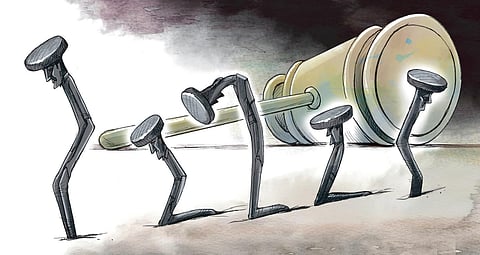

Albert Camus’s novel The Plague is a lesson to the human race on values—social, moral and political. It is often seen as an allegory for the political plague of Nazism that invaded France. It also vividly described the gravity of genocide caused by the pandemic. Across the world, a big calamity can have a tendency to make the state stronger and the people weaker. The present infestation is no exception.
Along with the miseries that the virus has brought in, the plight of migrant workers, household workers, rag pickers, daily wagers, street vendors and other marginalised among the workforce has now become part of the political discourse. The Supreme Court, on its own, cannot set right the problem. Let us see the relevant laws. The country had promulgated the Inter-State Migrant Workmen (Regulation of Employment and Conditions of Service) Act way back in 1979. It stipulates registration of establishments where such workers are employed. There are provisions for licensing of contractors.
The Act also provides for adequate wage rates, displacement allowance, journey allowance, etc., along with other facilities. Section 16 of the Act guarantees just and reasonable pay, suitable residential accommodation, free medical aid, etc. Non-compliance with the provisions could invite penal consequences. The country also designed the Unorganised Workers’ Social Security Act in 2008, with the laudable objective of providing better quality of life for workers in the unauthorised sector. It speaks about schemes to be designed by the Centre and state governments to improve the habitats of the proletarians.
These legislations were not only breached but even forgotten by the governments at the Centre and states. The radical provisions of the statutes remained a non-starter. Had it been otherwise, and had there been imaginative preparatory measures before the inevitable lockdown, the labour scenario would have been different. The sight of the moving populations of workers on the street once more echoed Camus’ prophetic words: “No longer were there individual destinies; only a collective destiny, made of plague...”
‘Stay at home’ is a hollow rhetoric for many Indians who do not have a home. The Census of 2011 revealed that there are more than 17 lakh homeless people in our nation. Right to housing has been recognised as a fundamental right in a few modern constitutions (see, for example, Section 26 of the South African Constitution). In India, right to property is longer a fundamental right as Article 19 (1)(f) was deleted from the Constitution with effect from 20 June 1979. Today, it is, at best, a constitutional right, as per Article 300A of the Constitution, which says that persons should not be deprived of property, except by authority of law. This constitutional silence about an enforceable right for residence was sought to be indemnified to some extent by the parliamentary legislations. The efforts, however, met with an executive apathy due to which the country now pays a hefty cost.
As Yale University professor Frank M Snowden demonstrated in his scholarly work Epidemics and Society: From the Black Death to the Present (2019), a pandemic can lead to an illiberal regime and an excessive exercise of power over the citizens. After the contagion, right to privacy is curtailed to a considerable extent, as its infringement is often justified by a public health emergency. Control over the media too could be in the state’s agenda. Journalists were booked for reporting the misdeeds of the persons holding power. There are also instances of human rights violations. During the hard times, free flow of factual information and reports needs to be ensured.
The lockdown and other executive measures in India are backed by the Epidemic Diseases Act of 1897 and the Disaster Management Act of 2005. The statutes contain penal provisions, and equip the authorities to deal with the offending individuals. Section 3 of the colonial statute makes disobedience of the order issued under the Act punishable under Section 188 of the Indian Penal Code. The Act, which was made by the British in the background of the bubonic plague outbreak, is not wholly adequate to meet the requirements of the present day’s globalised India. Obstructions to relief activities, false claims, false warnings, etc., are punishable under Chapter 10 of the 2005 statute.
Article 257 of the Constitution empowers the Union to exercise control over the states during certain exigencies but it does not alter the character of cooperative and collaborative federalism, a basic feature of our fundamental law. The Centre would do well in taking all the states into confidence in our historical endeavour for survival.
It is not enough to impose the rigour of law on the public. The challenge is also to realise the law’s humane face. Right to life, which means dignified life, has the protection of Article 359 of the Constitution, which says that it cannot be taken away even by the proclamation of Emergency. This was a significant constitutional correction done by the Janata regime under Morarji Desai by way of the 44th Amendment Act, 1978. It was the indignity attached to the poor Indians that got exposed during the days of pandemic. For them, Article 21, speaking about right to life became non est.
The freedoms under Article 19 also became redundant. As Amartya Sen demonstrated in his celebrated book Development as Freedom (1999), poverty inhibits freedom and access to resources. Poverty is not merely the poor man’s problem.National solidarity is an imperative to fight the virus and in the battle, constitutional values of justice, liberty, equality and fraternity can have a catalytic effect.
KALEESWARAM RAJ
Lawyer, Supreme Court of India
Email: kaleeswaramraj@gmail.com